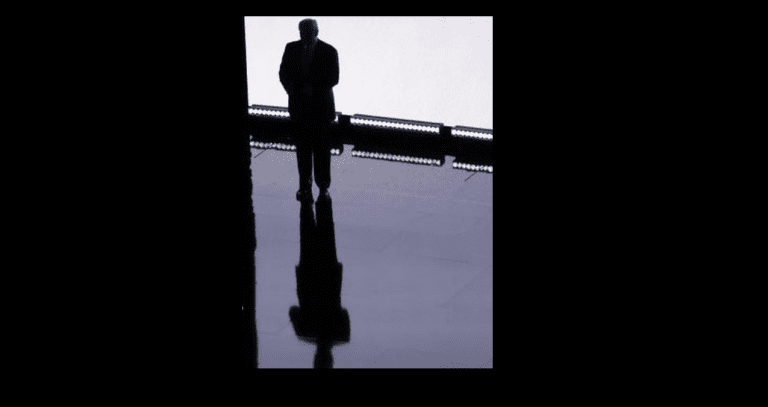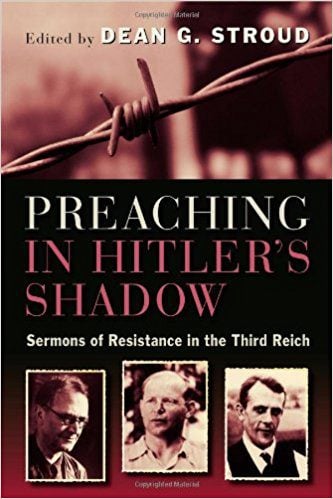I teach preaching and worship at a seminary and have spent the last three years surveying and listening to hundreds of mainline Protestant preachers share their experiences preaching in Trump’s shadow. What is it like for pastors to stand in the pulpit and preach the gospel during this administration? And what guidance does Luke’s Gospel give us?

Text: Luke 21:5-19
I’m reading a book right now where I came across these words describing a certain leader and his rise to power:
He seems to have thought about how Christians would view him . . . He certainly did not hesitate to reference God and to suggest divine support of his [agenda] . . . Getting off on the right foot with Christians in [this country] was certainly an early priority (4-5).
Further on, the author writes:
Surely if we have learned anything at all about [this leader], it is that nothing he ever said could be taken at face value. We must test his every word against what actually took place. These pious words . . . have no basis in reality. [It] is just another example of propaganda (5).
Can you guess who the author is talking about?
If you guessed Donald Trump, you would be wrong. The author is Dean G. Stroud and he is writing about Adolf Hitler. The book is called Preaching in Hitler’s Shadow: Sermons of Resistance in the Third Reich. His book is about the way Hitler used Christianity to give a patina of religious legitimacy to his Nazi ideology. The book includes 13 sermons by pastors who saw what was happening and courageously spoke out against the Third Reich.

I have to admit when I first read this book, I thought that Stroud had written it as a way to compare the current presidential administration in the United States to Hitler’s regime. But Preaching in Hitler’s Shadow was written in 2013 – two years before Trump descended the escalator to declare his candidacy in 2015. Yet as I read the book, the comparisons were so eerily similar, it gave me chills. Especially when considering Evangelical Christian support for this presidency.
In the book’s introduction, Stroud reminds readers of exactly how Hitler and the Nazis were different from the version of Christianity they put in place for Germany:
Although the Nazi program included a counterfeit ‘positive Christianity’ and although Hitler peppered speeches with references to God, neither he nor Nazism had a single thing in common with traditional Christianity. Nazi religion was pagan, containing a pagan savior and creed. The creed knew nothing of sin, and its faith glorified violence. Nazism had no meekness or humility, no love of neighbor, and no thought of forgiveness. Hitler was the German savior and Jews were the devil incarnate. Both Christianity and Nazism spoke of a Reich (empire, kingdom), but they had vastly different understandings about its meaning. (p. 9)
Similarly, the current occupant in the White House has claimed divine sanction for his actions.
He has quoted an Evangelical talk show host who said he was like “the King of Israel” and “the second coming of God.” His outgoing energy secretary, Rick Perry, has said that Trump is “the chosen one” sent by God. And Trump described himself as “the chosen one” while looking up at the sky.
What is especially pernicious is the way in which Evangelical Christians have flocked around the Trump candidacy and then ensconced themselves throughout the entire administration. Some of these leaders even claim divine power for themselves. Trump’s spiritual advisor, Prosperity Gospel minister Paula White, has proclaimed that “wherever I go, God rules. When I walk on White House grounds, God walks on White House grounds . . . because where I stand is holy.” [For a clear-eyed documentary on how Evangelicals helped Trump rise to power, watch: In God We Trump by Christopher Alan Maloney.]
With all of this in the background, we hear these words from Jesus:
“Beware that you are not led astray; for many will come in my name and say, ‘I am he!’ and, ‘The time is near!’ Do not go after them.”
These words are from the 21st Chapter of Luke’s Gospel, and are part of Jesus’ apocalyptic discourse. Scholars believe Luke was written in 85 CE not long after the destruction of the Temple in Jerusalem, and more than fifty years after Jesus’ death and resurrection. What is disconcerting is that this section of the Gospel describes circumstances that seem to be happening today as well:
“Nation will rise against nation, and kingdom against kingdom; there will be great earthquakes, and in various places famines and plagues; and there will be dreadful portents and great signs from heaven.” (vv. 10-11)
This sounds very much like what we’re seeing around the world, doesn’t it?
So does this mean we are living in the end times?
Fundamentalist Christians who want to sell you books like The Late, Great Planet Earth, or the Left Behind series, or the Harbinger series would like you to think so. Millennialist Christians in government who are angling for war in the Middle East in order to hasten the second coming of Christ would like you to think so.
But speculation about the end times and Christ’s Second Coming is not what Jesus is advocating here. Rather, he is giving instructions to his disciples on what to expect whenever a despotic regime takes over, no matter where or when that happens. Because whether you support or resist the Trump administration, the fact is that every generation goes through periods where political, cultural, and societal pressures build up until they reach a crisis point. Then there are ruptures that tear at the fabric of civilization.
It appears that we are in the midst of one of these cycles.
And it is precisely these kinds of conditions that create chaos in society. Chaos, in turn, breeds fear. Fear, for its part, drives people to follow men and women who seize power and who surround themselves with the trappings of religion in order to create an illusion of divine providence.
It happened during the Roman empire when Luke was writing this gospel. The Caesar was to be regarded as a god.
It happened in post-War World I Germany. As the Fuhrer, Hitler and the German state were to be worshipped and given complete obedience.
And there are indications that we are seeing this pattern repeat itself in authoritarian-dominated countries around the world today.
Jesus warned his listeners to be prepared for this pattern.
He tells them not to be shocked when dictators arrest those who speak out against them and persecute those deemed to be enemies. Whether that takes the form of Tweets and smear campaigns, or sending thugs to attack anti-corruption activists, or encouraging violence against journalists, or methodical, organized ethnic cleansing and genocide – we are not to be surprised when it happens. Yes, it is shocking. But we should not be caught off-guard like a deer in the headlights. And we are not to fall under the sway of mesmerizing or seemingly strong leaders who claim God’s authority while they are, in fact, doing the exact opposite of what God has told us is right and just.
Further, we are not to doubt God when all of this chaos is happening.
If the world is falling apart, we are not to see it as a sign of God’s abandonment. Instead, Jesus says that “this will give you an opportunity to testify” (v. 13). In Greek, the word is martyrion which means “to give a witness.”
This means that if you’re a preacher – preach the gospel! If you are a lay person, use your words and actions in whatever spheres you find yourself to live out the teachings of Jesus. Teachings like: love your neighbor. Care for the least of these. Forgive your enemies. In other words, everything that the corrupt leadership ignores, makes fun of, mocks, or even punishes – this is what Christians must do to maintain their moral clarity and their faith.
Jesus did recognize, however, that holding fast to his teachings may place you in opposition to everything and everyone you’re supposed to hold in high regard. This can include your family, your boss, even your nation. Some may even feel a rift with fellow church members. Or you may feel that sermons that address these issues are inappropriate because they’re “too political” and contribute to the divisiveness we’re experiencing. You would not be alone in thinking this.
Preaching in Trump’s Shadow
I have taught, researched about, and talked with hundreds of pastors over the past three years. Many of them are stymied when their more conservative or Trump-supporting parishioners walk out of their sermons, send angry emails, confront them face-to-face, or threaten to withdraw their financial support – even when the sermon mentions nothing about Trump or could in anyway be construed to be critiquing this administration.
This indicates that something much deeper is going on – something that involves the presence of a twisted theology that, when confronted with the actual teachings of Jesus, bristles because it is being challenged. This can lead to anger, mistrust, defensiveness, withdrawal, and even threats.
That’s what the pastors in Germany faced when they spoke out against the Reich.
They were told to keep their mouths shut and not to criticize what they saw happening in their country. If they disobeyed and preached the gospel anyway, many of them were removed from their churches. Some were put on trial or driven out of the country. A few were even executed.
Thankfully U.S. pastors have not yet faced this kind of backlash directly from the government. But the pressure from their parishioners to remain silent in the face of injustice is real and it takes many forms.
What is it like for pastors to be preaching in Trump’s shadow?
Here is what some of them have said in surveys and interviews I’ve conducted.
“I have lost members over the past two years due to preaching about race. There are only so many losses a small congregation can handle.”
“I have received threats in the past and worry that they might be acted upon if I continued to speak as freely as I would like.”
“One person threatened to disrupt a dialogue we were planning to have about the role of the church in a divided society. We explained that this wasn’t about trying to change people’s political orientation. It was just about how to learn to listen to each other and share our experiences in order to find common values. But this person was just so angry that we would even consider having this conversation in the church. It was very unsettling.”
Several pastors have told me that they have been accused of having a “liberal agenda” for just preaching the values of the Bible such as welcoming the foreigner, showing kindness to strangers, being compassionate, and caring for God’s Creation. All of this is seen as a thinly veiled critique of the president and his administration.
Interestingly, this is exactly what happened in Nazi Germany when the pastors refused to align with the Reich’s ideology.
Says Stroud: “Every sermon that advocated basic Christian virtues challenged the Nazi way of being. . . As Christians know from the New Testament, especially the Acts of the Apostles, simply preaching the gospel in the face of evil is sufficient to provoke violent response” (20).
As Jesus said: “You will be betrayed even by parents and brothers, by relatives and friends; and they will put some of you to death. You will be hated by all because of my name. But not a hair of your head will perish. By your endurance you will gain your souls” (Luke 21:16-19).
What does this endurance look like?
For the pastor who decided to go ahead with the dialogue in that church, it took the form of patience and deep listening, allowing the parishioner to express their thoughts and work through their concerns. In the end, they discovered that they can, in fact, have these difficult conversations in a way that helps them identify not just what their differences are, but what they have in common. By their endurance they gained their souls.
Another pastor wrote in the questionnaire about their unique context serving a church inside the DC beltway. “I’m preaching to policy-makers and political appointees who are incredibly well-informed. They’re also tired of politics when they get to church and need inspiration to keep fighting the good fight. I want to bolster their faith to enable them to go into their workplaces and have courage to enact the gospel.”
In other words, despite the risk, many pastors know that they are called by God, called by Jesus, called by the church to preach the gospel. Even when it runs counter to the prevailing attitudes of certain leaders. As one pastor put it:
“I receive negative pushback, and people have left. But I must preach gospel and it is political. Period.”
Stroud notes that the courageous pastors in Nazi Germany viewed preaching as vitally important for providing a counter message to the Reich. “Christian vocabulary, so different from the poisonous words of Nazi rhetoric, offered pastor and congregation a subversive language through which to share the faith and extend comfort” (43).
“Reading these sermons in the twenty-first century,” Stroud says, “one cannot help but marvel at the confidence these preachers placed in the proclaimed word of God. . . The preacher expected concentration and attention. Even more, the preacher expected the courage of faith. Urgent as things might be outside the church, preaching the word of God was even more urgent inside the church” (48).
I’ll leave you with one final thought written by a pastor who was the first to be murdered by the Nazis. His name was Pastor Paul Schneider, and this is what he wrote about preaching in Nazi Germany.
“It is not that I and all the rest of us have said too much in our sermons, but rather that we have said far too little.”
Schneider was like Dietrich Bonhoeffer, a Lutheran pastor who also resisted the Reich and was killed by the Nazis. Both of them believed so completely in the mercy, compassion and justice of Jesus Christ, they were willing to preach the gospel at all costs. I have no doubt that by their endurance, they gained their souls.
We, too, as preachers and parishioners, as Christians who confess our faith in the crucified and resurrected Jesus must continue to testify, to bear witness. We can do this trusting that Christ is with us and will give us the words. And he will, in fact, give us the endurance we need. And by this endurance we will gain our souls.
Looking for resources for preaching in Trump’s shadow? Check out these books:
Preaching in the Age of Trump by O. Wesley Allen
Preaching as Resistance: Voices of Hope, Justice, and Solidarity by Phil Snider
Preaching in the Purple Zone: Ministry in the Red-Blue Divide by yours truly!

Leah D. Schade is the Assistant Professor of Preaching and Worship at Lexington Theological Seminary in Kentucky. She is the author of Preaching in the Purple Zone: Ministry in the Red-Blue Divide (Rowman & Littlefield, 2019), Rooted and Rising: Voices of Courage in a Time of Climate Crisis (Rowman & Littlefield, 2019), and Creation-Crisis Preaching: Ecology, Theology, and the Pulpit (Chalice Press, 2015).
Twitter: @LeahSchade
Facebook: https://www.facebook.com/LeahDSchade/
Read also:
How to Preach When You Are Afraid













